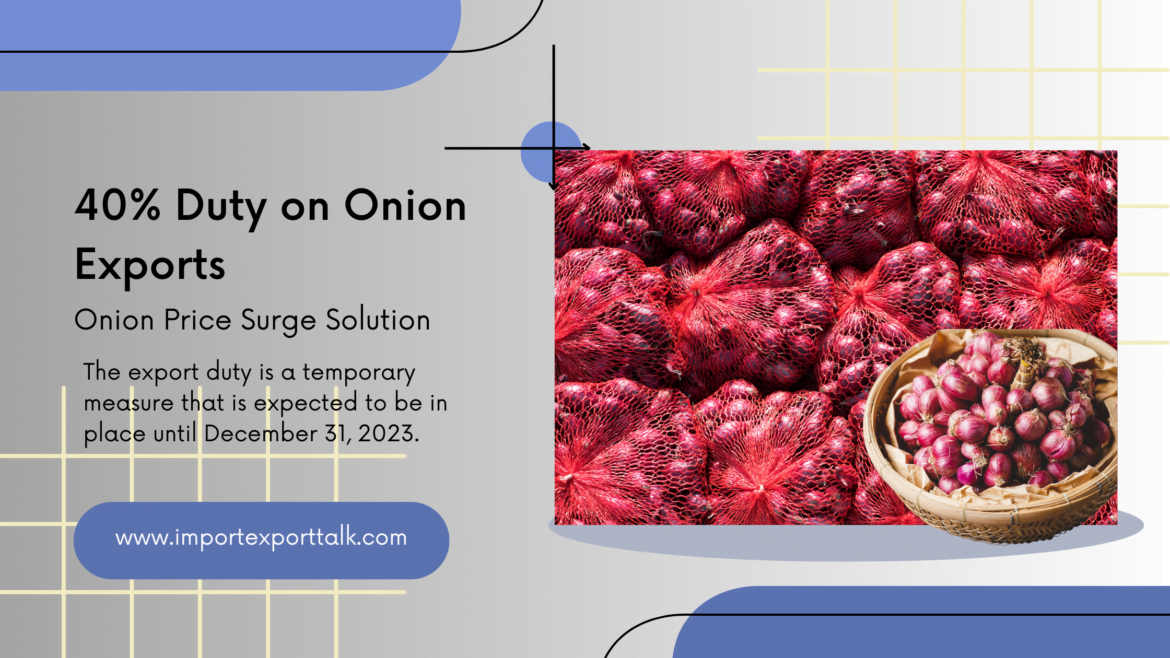The government on Saturday imposed an export duty of 40% Duty on Onion Exports to Tackle Price Surge with immediate effect to check price rise and improve supplies in the domestic market. Onion prices have been rising steadily in India in recent weeks, reaching a record high of Rs. 60 per kilogram in some parts of the country. The government has taken a number of measures to try to control prices, including releasing onions from its buffer stock and imposing a 40% export duty on onions.
The export duty is a temporary measure that is expected to be in place until December 31, 2023. It is designed to discourage exporters from selling onions overseas, which will help to increase the supply of onions in the domestic market and bring down prices.
Onion Price Surge: Understanding the Challenge
- Weather-related disruptions: The onion crop is highly sensitive to weather conditions. Heavy rains and floods can damage the crop, leading to a shortage of supply and higher prices. In recent months, there have been widespread rains in major onion-producing regions of India, which has damaged the crop and reduced supplies.
- Shortage of onion seeds: There is also a shortage of onion seeds in India. This is because many farmers opted to sell their entire produce during the rabi season last year after prices surged. This has led to a decrease in the area under onion cultivation, which has further exacerbated the shortage of supply.
- Increased demand: The demand for onions has also increased in recent months. This is due to the festive season, which is a time when people consume more onions. The increase in demand has put further pressure on prices.
- Speculation: There is also some speculation in the onion market, which has also contributed to the rise in prices. Speculation is when people buy onions in the hope of selling them at a higher price later. This can artificially inflate prices.
Imposing 40% Duty on Onion Exports
The government has taken a number of measures to control onion prices, including releasing onions from its buffer stock and imposing a 40% duty on onion exports. However, it remains to be seen whether these measures will be effective in bringing down prices in the long run. As per the data by the consumer affairs ministry, the all-India average retail price of onion was ruling at Rs 30.72 per kg on Saturday, with a maximum price at Rs 60 per kg and a minimum at Rs 10 per kg.
The government’s measures to control prices
1. Release of onions from buffer stock:
The government has released onions from its buffer stock to increase the supply in the market. The buffer stock is a stockpile of onions that the government maintains to ensure a steady supply of onions at reasonable prices.
2. Imposition of export duty:
The government has imposed a 40% duty on onion exports. This is to discourage exporters from selling onions overseas, which will help to increase the supply of onions in the domestic market.
3. Market intervention:
The government has also intervened in the market by buying onions from farmers and selling them to retailers at a lower price. This is to ensure that consumers do not have to pay exorbitant prices for onions.
4. Investment in infrastructure:
The government is also investing in infrastructure, such as cold storage facilities, to improve the storage and transportation of onions. This will help to reduce wastage and ensure a steady supply of onions throughout the year.
The government has said that it will continue to monitor the situation and take further measures if necessary.
The impact of the export duty on onion prices is still uncertain. Some experts believe that it will be effective in bringing down prices, while others believe that it will only have a temporary impact. The government will need to monitor the situation closely to assess the effectiveness of the measure.
The future outlook for onion prices is also uncertain. The weather conditions in the coming months will play a key role in determining the supply of onions. If there are no major disruptions to the crop, then prices are likely to come down in the long run. However, if there are further weather-related problems, then prices could remain high.
The Implications and Benefits
1. Stabilizing Domestic Prices:
The imposition of a 40% duty on onion exports is expected to stabilize domestic onion prices by ensuring a consistent supply within the country. By prioritizing domestic demand, the government aims to shield consumers from abrupt price fluctuations that can impact household budgets.
2. Curbing Speculation:
Market speculation often contributes to price volatility. The duty on exports sends a signal to traders and market participants that the government is committed to maintaining a stable onion market. This can discourage speculative activities that can artificially inflate prices.
3. Boosting Local Production:
By promoting domestic supply, the government’s move incentivizes local onion production. Farmers are more likely to increase cultivation in response to a predictable and stable market environment. This, in turn, can lead to higher production levels and reduced reliance on imports.
4. Ensuring Food Security:
Stable onion prices are crucial for ensuring food security and access to basic nutrition. Affordable onions are an integral part of daily diets for millions of households, making price stability a key component of broader food security initiatives.
5. Strategic Trade Management:
The imposition of a duty on onion exports showcases the government’s commitment to strategically managing trade flows. Balancing exports with domestic demand helps maintain equilibrium in both local and international markets.
Click on link for Notification
The decision to impose a 40% duty on onion exports is a strategic move that addresses the immediate challenge of onion price surges. By prioritizing stable domestic prices, curbing market speculation, and promoting local production, the government’s action reflects a commitment to food security, economic stability, and strategic trade management. As the world continues to navigate uncertainties, such game-changing measures highlight the government’s proactive role in safeguarding the interests of consumers, farmers, and the broader economy.
The Non-Tariff Barriers (NTBs) that are holding back India’s exports

